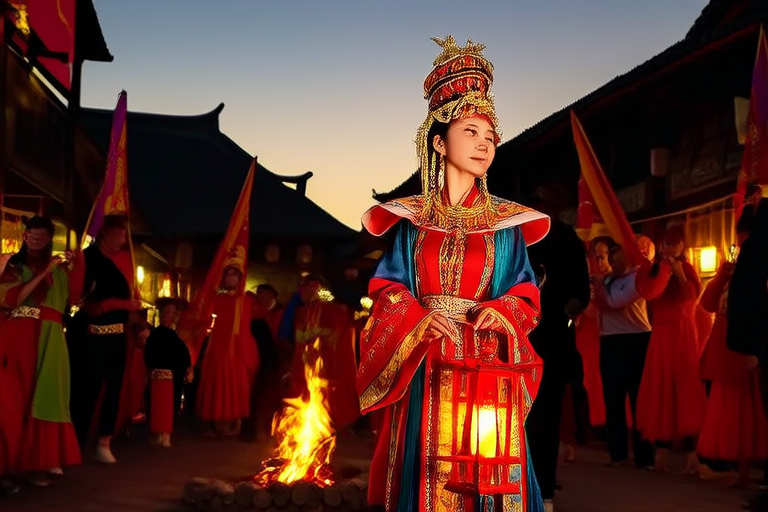A Journey Through Time: Celebrating Ancient Cultural Festivals

“`html
A Journey Through Time: Celebrating Ancient Cultural Festivals
Introduction
From the vibrant lights of Diwali to the colorful altars of Día de los Muertos and the luminous lanterns of the Lantern Festival, ancient cultural festivals around the world continue to thrive as living traditions. These festivals serve as powerful connectors, bridging the gap between the past and present, and offering a glimpse into the rich tapestry of human history. Despite the passage of millennia, these celebrations remain deeply rooted in the hearts and minds of communities, preserving cultural heritage and fostering a sense of unity.
The diversity of these festivals is remarkable, spanning continents and cultures. Each festival carries its own unique story, reflecting the values, beliefs, and customs of the people who celebrate them. Whether it’s the Hindu festival of lights, the Mexican Day of the Dead, or the Chinese Lantern Festival, these events bring together families, friends, and entire communities in a shared experience that transcends time and space. Today, these festivals are more than just celebrations; they are vital expressions of cultural identity and resilience, ensuring that the legacies of our ancestors live on.
Historical Significance
Diwali: The Festival of Lights
Diwali, one of the most widely celebrated festivals in India, dates back thousands of years. Originally a harvest festival, Diwali has evolved into a celebration of light over darkness, good over evil, and knowledge over ignorance. The festival commemorates the return of Lord Rama to Ayodhya after defeating the demon king Ravana. Over the centuries, Diwali has taken on additional meanings, symbolizing the triumph of spiritual enlightenment.
Today, Diwali is marked by the lighting of lamps, fireworks, and the exchange of sweets and gifts. Families gather to pray, share meals, and engage in acts of charity. Despite the festival’s deep roots in Hindu mythology, it has also become a secular event, celebrated by people of all faiths in India and beyond.
Día de los Muertos: Honoring the Dead
In Mexico, Día de los Muertos, or the Day of the Dead, is a vibrant celebration that honors deceased loved ones. Rooted in indigenous Aztec traditions, this festival was later influenced by Spanish Catholicism. The festival takes place on November 1st and 2nd, coinciding with All Saints’ Day and All Souls’ Day. Families create elaborate altars, known as ofrendas, adorned with flowers, candles, photographs, and favorite foods of the departed. These offerings invite the spirits of the dead to visit the living and share in their joy.
The celebration is a testament to the belief that death is not the end but a continuation of life. Through music, dance, and art, communities come together to remember and celebrate the lives of those who have passed, ensuring that their memories remain alive.
Lantern Festival: Lighting Up the Night
The Lantern Festival, celebrated primarily in China but also in other parts of Asia, marks the end of the Lunar New Year celebrations. It dates back to the Han Dynasty and has since become a beloved tradition. During the festival, people release floating lanterns into the sky and rivers, symbolizing the release of bad luck and the bringing in of good fortune. The lanterns are often decorated with intricate designs and carry messages of hope and peace.
Over the centuries, the Lantern Festival has evolved to include lion dances, dragon parades, and the consumption of tangyuan, sweet glutinous rice balls. These practices not only entertain but also reinforce the festival’s symbolic meaning of unity and prosperity.
Cultural Importance
Ancient cultural festivals play a crucial role in preserving cultural identity and fostering community bonds. They provide a platform for the transmission of traditional practices, rituals, and customs from one generation to the next. For instance, during Diwali, children learn the significance of lighting lamps and the importance of sharing in acts of kindness. Similarly, in Día de los Muertos, young people participate in creating ofrendas and attending community gatherings, ensuring that the memory of their ancestors remains a vital part of their cultural heritage.
Festivals also serve as occasions for communal bonding. In many communities, families and friends come together to prepare food, decorate homes, and participate in collective activities. These shared experiences strengthen social ties and promote a sense of belonging. Moreover, festivals often attract visitors from outside the community, providing an opportunity for cultural exchange and mutual understanding.
Modern Relevance
In an increasingly globalized world, ancient cultural festivals have adapted to contemporary life while maintaining their core values. Tourism has played a significant role in popularizing these festivals, drawing millions of visitors who wish to experience the unique traditions firsthand. Media, too, has contributed to the widespread recognition of these events, showcasing them in films, documentaries, and social media platforms.
Despite these changes, there are ongoing efforts to preserve and promote these festivals in the face of modernization. Many communities have established cultural centers and museums dedicated to teaching the history and significance of their festivals. Additionally, local governments and non-profit organizations work tirelessly to ensure that these traditions are passed down to future generations. By doing so, they help maintain the authenticity of these celebrations and ensure that the rich cultural heritage they represent continues to thrive.
Conclusion
Ancient cultural festivals are a testament to the enduring legacy of human creativity and resilience. They offer a window into the past, allowing us to connect with our ancestors and appreciate the richness of our shared history. In a rapidly changing world, these festivals remind us of the importance of cultural preservation and the value of community.
As we continue to embrace the modern world, let us not forget the lessons and wisdom embedded in these timeless celebrations. By participating in or learning more about these festivals, we can deepen our appreciation of diverse cultures and foster a greater sense of unity and understanding. Let us celebrate these ancient traditions with pride and enthusiasm, ensuring that they continue to illuminate our path forward.
“`